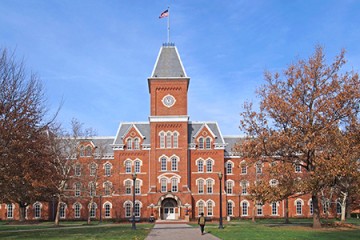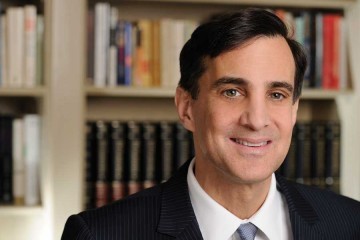Johns Hopkins University President Ronald J. Daniels discussed the future of public universities earlier this month on the final day of the annual Aspen Ideas Festival, calling attention to the increasing strain being put on state schools in the U.S. by governance, politics, and funding cuts.
Video credit: The Aspen Institute
Daniels spoke with New York Times journalist David Leonhardt about the need to protect funding for public universities, a conversation that dovetails with his recent report on the topic titled "Converging Paths: Public and Private Research Universities in the 21st Century."
One important shift that threatens the strength of public universities, Daniels noted, is the reduction of state funding, which is one of the factors fueling tuition increases for higher education. Net tuition—which factors in available financial aid—has increased by 136% at public universities since the Great Recession, compared to just 17% at private non-profit universities, Daniels said.
"But more than that," he added, "public universities are subject to a whole host of different constraints that really limit their capacity to be competitive with private peers and to discharge a lot of the goals they were originally created to serve. … In a number of ways, regulation is really hobbling their ability to function effectively."
Also see
Daniels advocated for depoliticizing public universities by "taking governors and state legislatures out of the business of appointing boards," and for clearer articulation of the role of public universities, in turn leading to less micromanagement by state governments.
Daniels and Leonhardt touched on a number of other topics during their 55-minute discussion, including the decline in federal funding for research. The dropoff has disproportionately affected young scientists, Daniels noted, a shift that poses grave risks for the future of science.
"If we look back at the great scientific breakthroughs that are made, they are typically made by young people—Einstein, Watson and Crick," Daniels said. "… It's typically people in their 20s and early 30s who aren't burdened by convention, who can think about a field anew and can really make transformative change. And those are the people that are falling out of the system."
Daniels also talked about Baltimore and how the city has responded to the unrest in the wake of the death of Freddie Gray in April 2015.
"[Those events] forced a recognition of the magnitude of the institutional failings that we have in Baltimore and, in truth, characterize a number of American cities—everything from woefully underperforming K-12 systems to lack of green space to high levels of violence and problems of criminal justice," Daniels said. "But what's been striking about Baltimore is, as a city of 600,000, it's just small enough that you can make change happen. And change is happening. It's got a great foundation community, and what's really been exciting is to see the stakeholders of Baltimore—business, foundations, the faith community—really rallying and using this as a moment when hopefully we can tip the city in a different direction."
The Aspen Ideas Festival, held June 23 to July 2 in Aspen, Colorado, is the nation's premier public gathering for leaders from around the world to discuss ideas and issues that shape our lives. This year's notable presenters included Vice President Joe Biden, Secretary of State John Kerry, International Monetary Fund Managing Director Christine Lagarde, former first lady Laura Bush, former presidential candidate Mitt Romney, and Attorney General Loretta Lynch.
Posted in University News, Voices+Opinion, Politics+Society
Tagged president ron daniels









